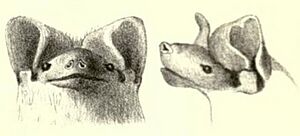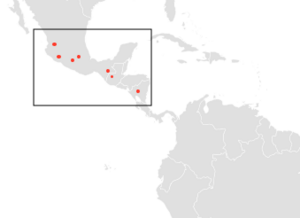Aztec mastiff bat facts for kids
Quick facts for kids Aztec mastiff bat |
|
|---|---|
 |
|
| Conservation status | |
| Scientific classification | |
| Genus: |
Molossus
|
| Species: |
aztecus
|
 |
|
| Aztec mastiff bat range | |
| Synonyms | |
|
|
The Aztec mastiff bat (scientific name: Molossus aztecus) is a small bat. It belongs to a group of bats called Molossidae, also known as free-tailed bats. These bats love to eat insects.
Contents
Where Does Its Name Come From?
A scientist named Henri Saussure from Switzerland first described this bat in 1860. He gave it the name aztecus. This name honors the ancient Aztecs, who were native people of Mexico. The bat was first found and studied in Mexico.
What Does the Aztec Mastiff Bat Look Like?
This bat is one of the smallest bats in its group, Molossus. It has soft, chocolate brown fur. Its wings, nose, and ears are a very dark brown color.
These bats are quite light, weighing about 12 to 16 grams (less than an ounce!). Their forearm, which is part of their wing, is about 34 to 35 millimeters long. That's about 1.3 to 1.4 inches.
How Does the Aztec Mastiff Bat Live?
The Aztec mastiff bat is a nocturnal animal. This means it is active at night. It hunts for its insect prey after the sun goes down. During the day, it rests and sleeps in hollow trees.
Female bats can sometimes become pregnant while they are still feeding a baby bat. This is a bit unusual for bats in its group.
Where Do Aztec Mastiff Bats Live?
These bats are found in several countries. Their home range stretches from southern Mexico down to Nicaragua. They have also been seen in Guatemala and southern Venezuela.
Aztec mastiff bats live in different types of forests. They can be found from areas near the sea up to high elevations. They are often seen at heights greater than 1,500 meters (about 4,900 feet) above sea level.


